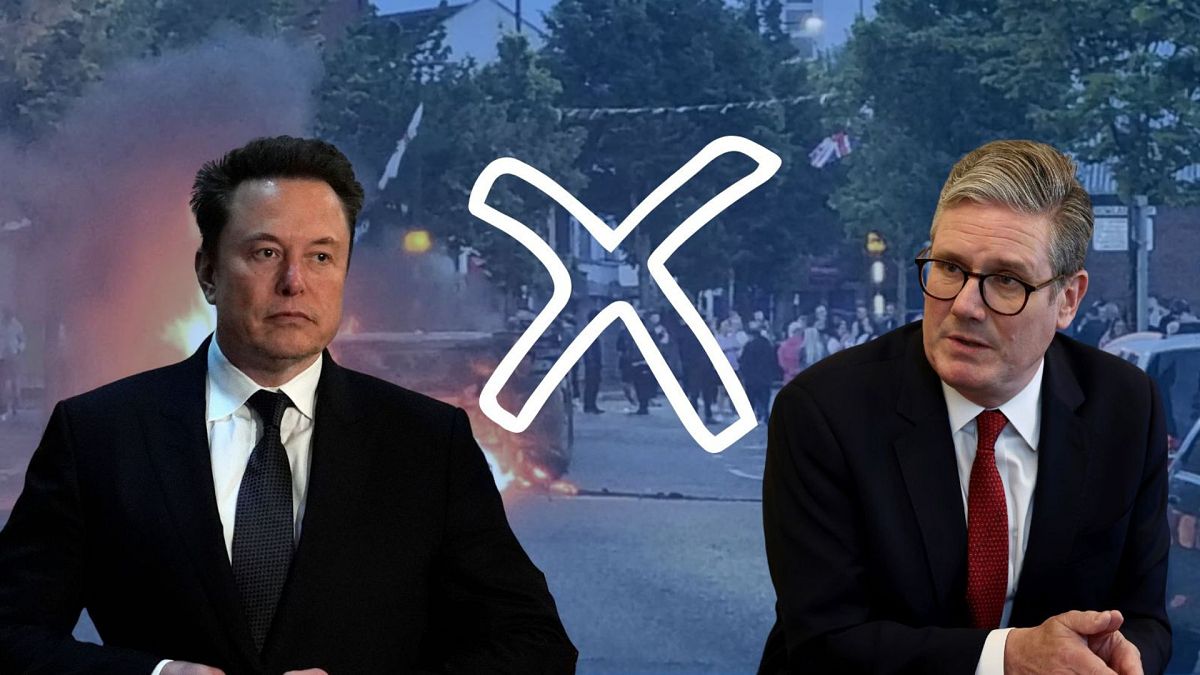Euronews takes a look at the series of false claims online, often magnified by X owner Elon Musk, which has had a significant hand in sparking riots across England and Northern Ireland.
UK Prime Minister Keir Starmer has been ensnared in a war of words with Tesla CEO Elon Musk over riots that have gripped the nation for the past week.
As pockets of far-right violence continue to erupt around the UK following a knife attack in Southport that killed three girls, Musk has blasted Starmer in a series of posts on X for his handling of the crisis.
Musk’s social media platform has played a central role in the saga up until now: it was first used as a tool to whip up frenzy and misinformation about the Southport attack and has since become a channel for the tech billionaire to criticise the prime minister and give an even bigger platform to the rhetoric that has led to the subsequent violence.
Here's a look at the posts on X that got us here.
False claims about the Southport killer take hold
Three girls were killed in a mass stabbing at a dance studio in the northwestern English town of Southport on 29 July.
The news instantly triggered speculation online over the identity of the alleged murderer, with many incorrectly claiming he was a Muslim immigrant.
It was soon announced that Welsh-born Axel Muganwa Rudakubana, a British citizen whose parents were originally from Rwanda, had been charged with murder in connection with the attack. Still, the Islamophobic narrative had already taken hold.
The name "Ali al-Shakati" was attributed to the alleged attacker, with no official source given to the name. Fact-checkers have since traced it to a dubious Russian-linked fake news outlet masquerading as a legitimate American news site.
The claim was picked up by far-right agitators online, including anti-Islam activist Tommy Robinson, whose real name is Stephen Yaxley-Lennon.
Controversial influencer Andrew Tate incorrectly said on X that an "undocumented migrant" who "arrived on a boat" was behind the killings, while Nigel Farage, leader of the far-right Reform UK party, questioned whether police were telling the truth when they said the attack wasn't terror-related.
The claims quickly spiralled among xenophobic, far-right groups, who quickly came together to spark riots in more than a dozen towns and cities in England and Northern Ireland.
Starmer takes swipe at social media
The UK government has repeatedly denounced the violence, with Starmer making a series of emergency speeches in which he blasted the "far-right thuggery" gripping certain pockets of the UK and announced new measures to crack down on those taking part — whether directly or from afar.
In one speech, the prime minister noted the dangerous role that social media can play in whipping up public disorder, which some saw as him throwing barbs at Elon Musk.
Musk enters the fray
Criticism of social media and X in particular for their part in provoking the riots soon began making the rounds online, with much of it aimed at X's owner Elon Musk.
The story caught the eye of the tech billionaire, who soon began making his own incendiary remarks against the situation in the UK, such as "civil war is inevitable" and likening the country to the Soviet Union.
As Starmer and the rest of the UK government continued to update the country on the state of the violent unrest, Musk continued to wade in.
The prime minister's spokesperson said there was "no justification" for Musk's comments and that social media companies should be doing more to stop the spread of hateful messages.
Among his potshots against Starmer, Musk has regurgitated the unsubstantiated idea of different approaches to policing pushed by the likes of Robinson and Farage. Government ministers and police have repeatedly refuted the claim.
Robinson has since seized on Musk's words and used them to amplify his own as he continues to fan the flames of racism and violence online.
In other posts, Musk appears to repeat a claim that has been circulating widely among the far right that the UK media is stacked against them. This is misleading: broadcasters are bound by impartiality rules and regulated by the telecommunications authority Ofcom.
The British print and digital news industry on the other hand does not have the same impartiality requirement and newspapers often show their political ideology. However, the vast majority, such as the Daily Mail and the Daily Express, are right-leaning and therefore naturally misaligned with the UK's centre-left Labour government.
Sometimes the Tesla CEO refrains from commenting himself but instead boosts controversial claims made by others.
He often responds to posts such as those below with single-word messages expressing his agreement with or approval of what is being said. At other times, he responds with posts such as '!!'.
Doing so hugely amplifies the original post, owing to his vast following on X (over 190 million followers) and inevitable influence on the algorithm, which has the potential to give misinformation and incendiary messages significant reach online.
His posts can easily pick up hundreds of thousands of views.
Musk is no stranger to courting controversy online. He routinely makes inflammatory remarks on his social media platform about a whole host of topics, including US politics, transgender issues and immigration.
Thanks to his high status and significant sway in the social media world, such comments can easily catch the media spotlight, driving users back to X and ultimately back into Musk's sphere of influence.
Countries have looked to take more steps to regulate social media in recent years over its potential to facilitate the spread of misinformation and hate speech.
The EU recently brought in its Digital Services Act, which requires platforms to take more responsibility for protecting their European users and cleaning up harmful or illegal content and products on their sites, under threat of hefty fines.
In the wake of the riots, UK government officials such as Technology Secretary Peter Kyle and Home Secretary Yvette Cooper have hinted that they also have social media companies in their sights.
Despite the UK passing an Online Safety Act around a year ago, the law is not yet fully in force.












